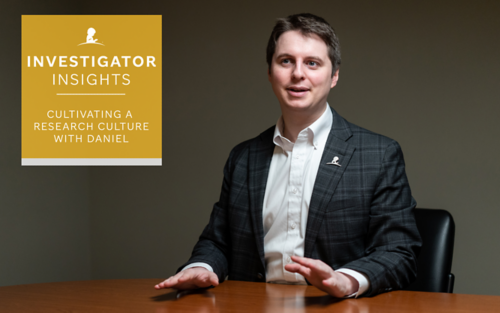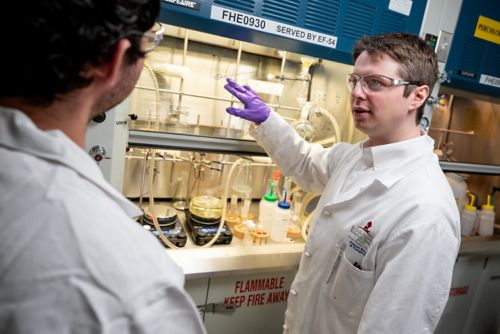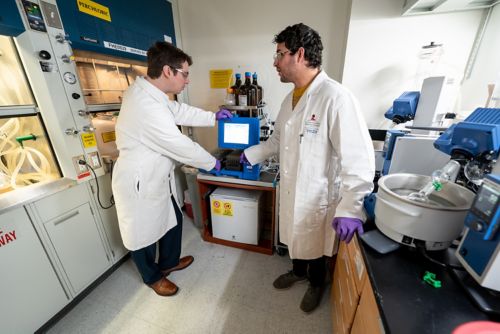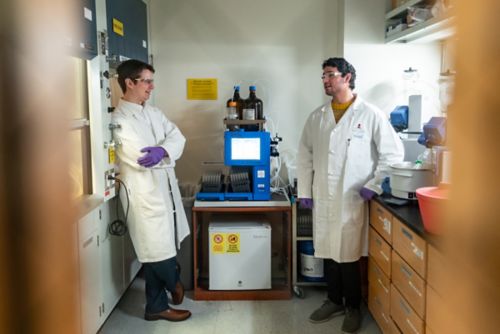St. Jude Family of Websites
Explore our cutting edge research, world-class patient care, career opportunities and more.
St. Jude Children's Research Hospital Home

- Fundraising
St. Jude Family of Websites
Explore our cutting edge research, world-class patient care, career opportunities and more.
St. Jude Children's Research Hospital Home

- Fundraising
Investigator Insights: Cultivating a Research Culture with Daniel Blair, PhD

Daniel Blair, PhD, shares how he cultivates a people-focused research culture in his laboratory within the Department of Chemical Biology and Therapeutics at St. Jude.
When you’re a new principal investigator (PI), you’re trying to keep track of all the things you need to do, alongside all the things you want to do. Right away, you’ve got to buy all this equipment. You’ve got to get it all in the lab. You’ve got to handle the logistics and so many other things you never had to deal with before—all the things that aren’t the science, but make the science happen.
Amongst all that, you must choose how you want to approach this new platform you’ve been given. What’s the best way to use the opportunity and responsibility of being a new PI? How you choose to do things no longer influences just you. It influences everyone in the lab and how those people carry themselves, both professionally and personally. And that’s a tricky landscape to navigate.

Daniel Blair, PhD, illustrates a concept in his laboratory.
But it’s a landscape that offers immense rewards—if you give it the proper reflection and consideration. I’m trying to be as thoughtful as possible about the best way to approach my new responsibility. Part of that is thinking carefully about how to create my lab’s culture. It’s easy to fall into the trap of thinking, “Well this worked for my boss, so that’s what should work for me.” But that isn’t always the case.
You need to prioritize, and some things naturally fall by the wayside. You may find that what was important to your old bosses and mentors may not be what’s important to you.
There must be a balance between many different needs and responsibilities. We benefit from a resource-rich environment at St. Jude, which allows us room to focus on what is most important to us. For me, that’s the people in my lab. My philosophy is that if you prioritize the people, then the best science will follow. Because they’re the ones doing the work.

Daniel Blair, PhD, and postdoctoral research associate Gary Arevalo, PhD, discuss work in the lab.
I realize it’s not just me. My team and I are building the lab together. Because it’s a team effort, creating that team takes on increased importance. So, the real question isn’t so much, “what kind of culture do I want to create,” but “who are the people that can build a culture of positive scientific inquiry with me?”
It’s difficult to know someone from a piece of paper, and I’ve tried my best to talk to as many people as possible to see whether they match the values—kindness, balance and vision—that I want to embody in the lab. That’s really important. But another trap that’s hard to avoid is the pull of, “I need people right now.” I recognize that to build something great, I must be patient.
Balancing these priorities is difficult but finding people who share common values and want to participate in a positive environment is worth the patience. By building it that way—by focusing on the people—a cultural momentum in the lab builds. It’s important to get that momentum right, because once the lab culture is built up it’s near impossible to change, because like usually attracts like.

Daniel Blair, PhD, and postdoctoral research associate Gary Arevalo, PhD, take a moment to chat at the bench.
I hope to attract sincere individuals that want to do the science. When you make that the focus, people feel more welcome and in turn can start to build a community. That’s one of the biggest rewards of being an early-career investigator: you get to set the tone.
I can’t imagine using this position for anything other than a force for doing good. Even as a leader, you can be kind. If everyone’s sincerely motivated about wanting to do good things, and about answering science’s most elusive questions, there’s a solid foundation for any lab. Once we have that foundation, the science will flourish.






